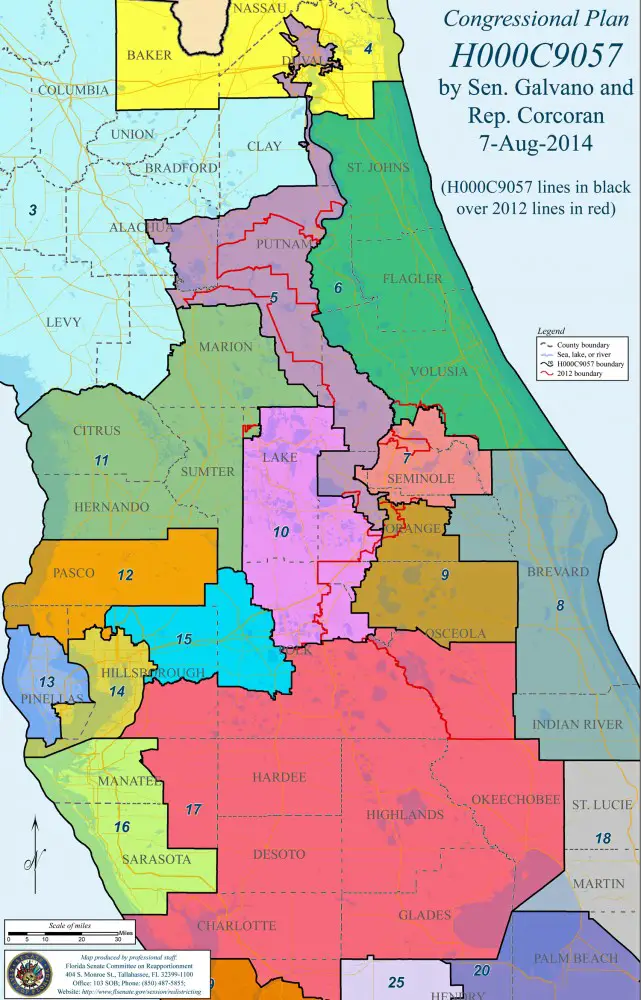
Lawmakers passed new congressional districts on nearly party-line votes in the House and the Senate on Monday, sending the map back to the courts as early voting opened in some counties.
As they did the first time they approved a congressional map in 2012, Republicans applauded themselves Monday for following the anti-gerrymandering Fair Districts amendments approved by voters in 2010. But Democrats said the GOP did little to actually change borders that they said were still unfairly tilted toward Republican candidates.
The House voted 71-38 to approve the map (SB 2A), which was needed after Leon County Circuit Judge Terry Lewis struck down two congressional districts he said were drawn to buoy the GOP’s chances at the ballot box. Reps. Mia Jones and Reggie Fullwood, both of Jacksonville, were the lone Democrats to support the map in the House.
Two Senate Democrats, Sens. Audrey Gibson of Jacksonville and Bill Montford of Tallahassee, voted with the GOP as the plan cleared that chamber on a 25-12 vote. Earlier, the Senate voted by the same margin to reject a proposal by Sen. Darren Soto, D-Orlando, that would have made substantial changes.
“I certainly hope that litigation time is over and that fair voting time has started,” said Senate President Don Gaetz, R-Niceville.
Congressional District 6, which includes all of Flagler County, was among the districts affected, as it flanks much of Congressional District 5, one of the two districts deemed improperly drawn by the Legislature. Flagler County was unaffected, but District 6 had previously included most of Putnam County. It now includes only the southeastern quadrant of Putnam. No changes were made to the district in St. Johns County.
But in Volusia, the district added two more slivers of Volusia County. The changes are not likely to change the ideological make-up of the district, which tilts Republican. The district is currently represented by Rep. Ron DeSantis, who defeated a half dozen Republicans in a primary two years ago, largely on the basis of outspending his opponents but also drawing on tea party support. He defeated Democrat Heather Beaven with 57 percent of the vote, in Beaven’s second try to represent Flagler and its broader district. DeSantis garnered 52 percent of the vote in Flagler.
Lewis ruled the original map unconstitutional last month after voting-rights organizations and some individual voters filed a lawsuit saying the plan didn’t follow the Fair Districts amendments. In his decision, Lewis said lawmakers put too many African-American voters in Congressional District 5, currently represented by Democratic Congresswoman Corrine Brown, in an apparent effort to channel those Democratic-leaning voters away from surrounding districts.
The judge also found fault with an appendage of white voters added onto Congressional District 10, now represented by Republican Congressman Dan Webster; Lewis said the voters were placed in Webster’s district to try to help the incumbent hold onto his seat.
Democrats argued that the process this time was no better than it was two years ago — a process Lewis said was corrupted by the influence of political consultants despite the efforts of some legislative leaders to follow the amendments.
“Such behind-the-scenes collusions violated the constitution as well as the public’s trust. … Nothing really changed in this process this time around which would restore the integrity called into question the first time around,” said Rep. Karen Castor Dentel, D-Maitland.
Democrats also bristled at when the new districts are scheduled to take effect. Senate Reapportionment Chairman Bill Galvano, R-Bradenton, said the bill would apply to any elections after the November general election. As an example, the redrawn districts would be in effect if Lewis requires a special election later in the year.
Republicans maintain that it’s too late to change the date of the primary and general elections for Congress, given that tens of thousands of absentee voters, including soldiers serving overseas, have already returned their ballots. Primary elections are scheduled for Aug. 26, with early voting starting Monday in some counties and later elsewhere.
But Senate Minority Leader Chris Smith, D-Fort Lauderdale, said voters should not cast ballots in this fall’s elections in districts that Lewis has already said violate the anti-gerrymandering Fair Districts standards.
“This isn’t about convenience,” Smith said. “This is about democracy.”
While the changes were focused on District 5 and District 10, they would affect seven congressional districts. Soto’s proposal would have only affected three districts, but critics questioned, in part, whether it would diminish the ability of black voters to elect a candidate of their choice in District 5.
Sen. David Simmons, R-Altamonte Springs, said Soto’s proposal “significantly backslides” on the minority-voting issue.
“We are bound not to diminish the ability of minorities in Congressional District 5 to elect the candidates of their choice,” Simmons said.
Lewis is expected to hold a hearing next week on whether to approve the changes and, if so, whether to hold a special election in districts that would be affected by the plan.
Gaetz left open the possibility that the Legislature could appeal if Lewis delays the regularly scheduled elections, and he predicted that the map’s critics would continue fighting.
“I would expect that the plaintiffs won’t be happy until they can win in the courts what they always lose on Election Day,” he said.
–Brandon Larrabee, News Service of Florida, and FlaglerLive






























Leave a Reply